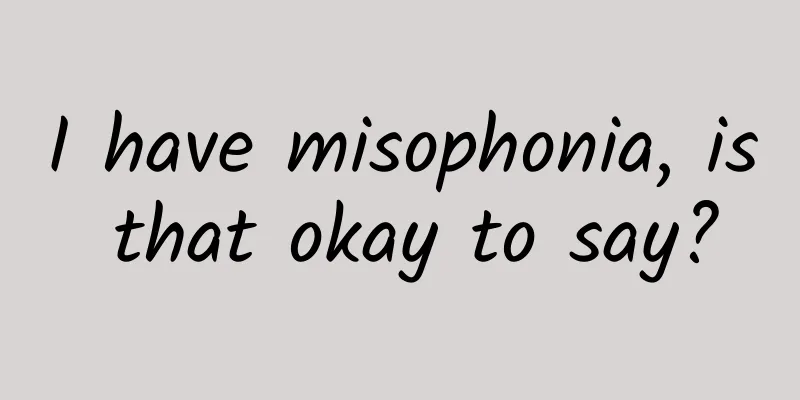I have misophonia, is that okay to say?

|
There are always some sharp and harsh sounds in life, such as chalk scratching on a blackboard, vehicle emergency braking, knife and fork scratching on a plate... just thinking about it makes me feel uncomfortable. But some people are in a "doomsday" surrounded by sounds every day. The chewing, coughing, and even breathing sounds of others may trigger their emotional minefields and cause an inner explosion. If you feel the same way, perhaps you also have misophonia. "Misophobia", also known as "selective sound sensitivity syndrome", literally means "hate of sound". Patients will have strong and involuntary reactions to specific sounds (trigger sounds), including negative emotions such as disgust, irritability, nausea or anxiety, and sometimes also rapid heartbeat, excessive sweating and muscle cramps. Here is how patients describe their feelings when they have misophonia, as recorded by the BBC: "That kind of sound would immediately make me nervous and anxious. It was as if my body was telling me that there was danger and I had to leave or protect myself." "I felt it in my internal organs, like extreme anxiety, or I was suddenly swallowed up and overwhelmed. I was at a loss and couldn't do anything." "If someone put a gun to my head, it would feel exactly the same." Ultra-sensitive connection Initially misophonia was thought to be a sound processing disorder, but last year researchers at Newcastle University's Institute of Biosciences found for the first time that misophonia patients have increased connectivity between the auditory cortex and motor control areas associated with the face, mouth and throat, creating a "hypersensitive connection". The related paper, titled "The Motor Basis for Misophonia", was published in the Journal of Neuroscience. Brain scans of people with misophonia show that their brains' auditory cortex (the hearing center) responds similarly to people without the condition, but there is increased communication between the auditory cortex and motor control areas associated with the face, mouth, and throat. These motor control areas are strongly activated by, and only in response to, the trigger sounds of people with misophonia. Therefore, researchers believe that the trigger sounds for misophonia are usually the sounds of someone chewing, breathing or talking, which are related to mouth, throat or facial movements. This is the first time such a connection has been discovered in the brain, and it could have implications for the treatment of misophonia. In addition, the study found that similar patterns of communication between visual and motor areas also occur when vision is triggered in misophonia. This communication activates the "mirror system" in the brain, which can activate the patient's brain in a similar way to process other people's movements - as if they were making that movement themselves. This involuntary overactivation of the mirror system can cause patients to feel that the sounds made by others are invading their bodies and are beyond their control. Based on this, the researchers suggest that "some people with misophonia may be able to reduce their symptoms by imitating the movements that produce the triggering sounds, which allows them to feel more in control. This knowledge could be used to develop new treatments for patients." More than just chewing However, recent research results from Ohio State University suggest that previous explanations for misophonia may be inaccurate and that areas outside the orofacial motor cortex may also trigger misophonia. The study, titled “Neural evidence for non-orofacial triggers in mild misophonia,” was published in Frontiers in Neuroscience. The new study is the first to examine what happens in the brain when people repeatedly tap their fingers, finding that finger tapping may also be a trigger for misophonia and that it has a different connection pattern to the chewing area and brain. Nineteen adults with varying degrees of misophonia participated in the experiment, which mainly performed two tasks. One was to vocalize various syllables. The functional magnetic resonance imaging results show which areas of the brain are activated by speech, which have a large overlap with oral and facial movements and are related to sounds such as chewing. The other was to repeatedly tap their legs with their fingers, which is another action associated with misophonia. In addition, MRI scans were also performed when the participants did nothing. The results showed that when they were resting, participants with higher levels of misophonia did show stronger connections between the auditory cortex and motor control areas, consistent with previous research. However, another area of the brain was active when participants made sounds with their mouths, and those with higher levels of misophonia did not show stronger connections in this area compared to those with lower levels of misophonia. These findings suggest that the "supersensitive connections" found in earlier studies cannot fully explain misophonia. **In participants with higher levels of misophonia, there was a stronger connection between brain regions associated with finger movement and sensation and regions of the insula associated with strong emotions, including disgust. **This suggests that misophonia is more than just chewing and other oral noises, and that research into the causes of misophonia needs to expand beyond orofacial motor areas. "This adds to our understanding of the many ways misophonia can occur and identifies people who do not experience misophonia from chewing, but do experience symptoms triggered by other repetitive noises," the researchers said. Lonely Patient The documentary Quiet, Please takes an in-depth look at misophonia. Director Jeffery Scott Gould, who has suffered from misophonia for 50 years, invites experts in neuroscience, psychology, audiology, and other clinicians to discuss patients' experiences, possible coping mechanisms, and the current state of misophonia research. The film interviewed many people with misophonia, and the feeling they repeatedly mentioned was "loneliness." Open offices become minefields full of triggering sounds. They cannot concentrate at work and are very prone to conflicts with others. Their family life may also be affected, and it will be more difficult for them to get along with their partners, because the other person's breathing and chewing sounds may make them furious. Troubled interpersonal relationships may lead them into the cage of self-autism. " Misophonia affects not only those who suffer it, but also those closest to them," the director said in the introduction. "But good interpersonal and family relationships are still possible, which requires effort, compromise, understanding and compassion from everyone." Some of the currently known treatments for misophonia include: diverting attention and associating annoying sounds with pleasant experiences. For example, if the patient hates the sound of eating cookies, let him listen to the sound while smelling the aroma of freshly baked cookies. In addition, taking antidepressants can also have a certain auxiliary effect. The social environment is equally important. As more people know and understand misophonia, patients will also do what they want: "I can speak directly to people, and they won't think I'm a monster." Reference Links: https://www.bbc.com/ukchina/simp/48676842 https://www.sciencedaily.com/releases/2021/05/210524110143.htm https://www.jneurosci.org/content/41/26/5762 https://www.sciencedaily.com/releases/2022/08/220817103949.htm https://www.frontiersin.org/articles/10.3389/fnins.2022.880759/full Misophonia Documentary: Quiet Please - Exploring Misophonia (quietpleasefilm.com) |
<<: If skin care products have good ingredients, will they definitely be effective?
>>: Eat me? Want to eat me again? Eat me again...
Recommend
How to efficiently guide products to achieve self-propagation growth model
As a member of the growth department, when observ...
Summary of practical experience in 3 steps of community operation!
A while ago, a friend of mine just started a busi...
Electric Technology Car News: When SUV models are flooded, Kodiaq, which is better than Trumpchi GS8, will change the situation
The popularity of SUVs in the Chinese market is a...
How many steps are needed to make a leaf?
When you step on the fallen leaves on the road an...
How does Baidu bidding bring you business?
Pay-per-click marketing is a way to bring traffic...
Which behaviors that you think are sick are actually "physiological preferences"?
【Written at the end】 Love is the result of long-t...
Honda China: Honda China's terminal sales of automobiles in October 2024 will be 75,400 units, with cumulative sales in the first 10 months down 31% year-on-year
Recently, according to domestic media reports, Ho...
Eating more dietary fiber can help reduce inflammation levels in the body! Which foods have good anti-inflammatory effects?
Inflammation is the common "soil" for m...
Analysts say iPhone 6s initial sales did not actually increase
This article is transferred from: NetEase Technol...
WeChat officially launches Windows client
On the evening of January 27, WeChat officially l...
A great ingredient that is seriously overlooked! It has a higher protein content than eggs
If we divide the country by north and south, the ...
What is the refraction of light? Why does light bend downward when it enters water, while chopsticks in water bend upward?
Many people have this question. The explanation i...
Slime, which doesn't even have a brain, can actually plan city routes
You must be familiar with slimes. Their names oft...
Darwin was wrong? I didn't expect to come to this conclusion while singing karaoke...
Compiled by: Gong Zixin What does it feel like to...
Mini Program promotion and operation plan, how to write a mini program operation plan?
Many businesses have realized the huge advantages...









